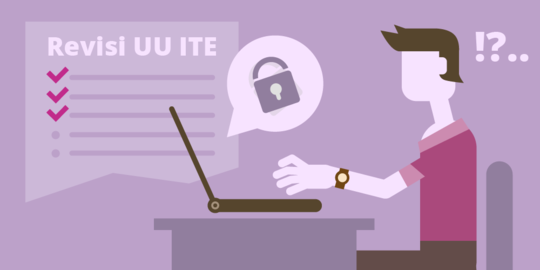Community Supports Planned Revision of the ITE Law
By: Zakaria) *
The government has proposed to the DPR to revise the ITE Law which often creates multiple interpretations. The community also supports and appreciates this proposal as an effort to create justice but is still able to create a conducive climate in the cyber realm.
The ITE Law is considered a rubber article by some people, its existence seems to be a weapon for someone to throw others into legal channels. So that the ITE Law should be revised.
The Honorary Teacher from West Nusa Tenggara (NTB), Baiq Nuril, is one of the people who has been involved in a legal case through the bondage of the articles of the Law on Information and Electronic Transactions. He also admitted that he felt inferior about the case that happened to him.
When charged with the ITE Law in 2018, Baiq admitted that he often blamed himself for what happened to him at that time. This was conveyed by Baiq while crying when he remembered what happened to him two years ago.
When he conveyed his attitude and views in front of the ITE Law Revision Study Team which was formed by the coordinating minister for Political, Legal and Security Affairs (Menko Polhukam) Mahfud MD, Baiq openly hoped that the law, which had claimed many victims, including himself, could be revised immediately.
Baiq admitted that he did not want other people to experience what he had experienced because of the same laws and articles.
Baiq Nuril is a teacher in NTB who was convicted of being caught in the articles of the ITE Law, while he was a victim of sexual harassment at that time.
The Baiq Nuril case then received national attention. The struggle for freedom brought him to the DPR, until finally getting amnesty from Jokowi in July 2019.
In line with Baiq, journalist from South Kalimantan Diananta P Sumedi considered Jokowi’s statement a breath of fresh air. Therefore, he is waiting for concrete steps from the revision of the ITE Law.
The former Pimred Banjarhits said the ITE Law was very flexible and had multiple interpretations. He also regretted that a journalist like himself who did journalistic work was actually being punished under the ITE Law.
He is also worried that if the ITE Law is not revised, it will become a weapon used by companies and the government to silence critical journalists.
Diananta’s narrative is shared by public policy researcher Ravio Patra. Ravio, who was charged with the ITE Law, was actually related to messages sent via his hacked cellphone saying that the revision of the regulation was necessary because his repression often served as a gateway to criminalization with other articles such as treason and others.
Apart from Baiq Nuril, the ITE Law Revision Study Team also invited a number of other sources. Among them are Ade Armando, Dandy Dwi Laksono, to Bintang Emon.
The team also invited a number of public figures and figures who have been trapped by articles in the ITE Law. Among them, Muhammad Arsyad, Ravio Patra, Prita Mulyasari, Yahdi Basma, and Teddy Sukardi. Meanwhile, among the reporters whose statements will be heard are Alvin Lie, Nikita Mirzani, Dewi Tanjug and Muanas Al Aidid.
The head of the ITE Law Study Team, Sugeng Purnomo, said that on average, informants who were questioned focused on article 27 and article 28 of the ITE Law.
As revealed by Baiq Nuril, Sugeng also admitted that the sources, both reporting and reported parties, both hoped that the revision of the ITE Law was not just a discourse.
Sugeng said, there were suggestions related to the revision of several articles. The articles that are most highlighted are article 27 and article 28. According to them, among them, it is necessary to have clarity on the normalization and implementation.
On a different occasion, the Civil Society Coalition said that the criminal element in the regulation was still vague and the assessment was very subjective, so it was difficult to establish a firm standard of interpretation in its application. They also considered that the legal certainty of the regulation was weak.
Elsam, as a member of the coalition, emphasized that improvements must be made to the criminal provisions in article 27 and article 29 which equate crimes arising from computer technology.
He also considered that what was needed to fix problems in the realm of technology and information was not only to revise the ITE Law. According to them, the government should sit down with the DPR to discuss the revision of the ITE Law.
Revision of the ITE Law is something that must be done, this is intended so that the law does not contain rubber articles that are able to prosecute anyone.
